Best Homestead Animals
Identifying the best homestead animals depends on your resources, needs, and interests. Homesteading is a lifestyle of self-sustainability, often associated with producing one’s own food and goods. A critical aspect of this lifestyle is the selection of appropriate animals for your homestead. So what are the best homestead animals?
Homestead Chickens
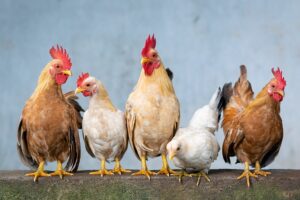
Chickens are generally the first animal most homesteaders decide to try. They are fairly easy to keep. They just need a safe place to roost at night and food and water. There are many ways you can set up your feeding and watering systems that would allow you to safely go away for several days. So long as you don’t get a rooster they are fairly quiet animals. They can provide both meat and eggs. If you plan to use for meat they are relatively easy to process.
Chickens also offer the advantage of being efficient composters. They will happily eat kitchen scraps (avoiding anything toxic like onion, chocolate, or avocado), helping to reduce household waste. Their droppings, rich in nitrogen, can be added to compost piles to enhance soil fertility. However, on the downside, chickens can be susceptible to various diseases and pests, such as lice, mites, and worms, which can affect their productivity and overall health. Many books of the subject of how to treat various health issues are available. Most issue can be treated at home. Another consideration is that chickens may attract predators such as foxes or raccoons, so secure housing is a must. Lastly, depending on local zoning laws, raising chickens may not be permitted, or the number of chickens may be restricted. It is advisable to check local regulations before starting a backyard flock.
Homestead Rabbits
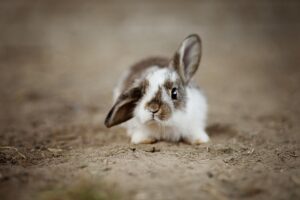
Rabbits provide several key advantages for a homestead. They reproduce quickly, providing a reliable source of meat. Their fur can also be harvested and used in creating garments and other household items. Moreover, rabbit manure is rich in nutrients, making it an excellent addition to compost piles. Rabbits require minimal space to house and are generally easy to handle. On the flip side, rabbits require a balanced diet and diligent care to stay healthy. Overfeeding can lead to obesity, while lack of variety in their diet can cause digestive issues. Like chickens, rabbits can also attract predators, necessitating secure housing. Furthermore, they can be a bit skittish and may not be the best fit for households with small, energetic children. Finally, raising rabbits for meat may be subject to local laws and regulations, so it’s essential to research and comply with these legalities.
Homestead Goats
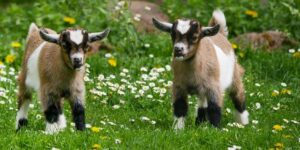
For those with a bit more land, goats are a viable option. They offer a variety of products—milk, cheese, meat—and even a bit of landscaping help. However, these animals require robust fencing to keep them contained, proper feeding to maintain health, and some attention to their health care needs.
Goats provide an array of benefits for the homesteader. They are known for their ability to clear land, eating many types of vegetation that other animals may not. This can help in managing overgrown areas without resorting to chemical treatments. Goats are also social and intelligent animals, often developing strong bonds with their caretakers, which can make them a pleasure to have around.
The milk produced by goats is highly nutritious, offering a healthy and sustainable alternative to cow’s milk. It’s also suitable for making homemade cheese and yogurt. The meat of goats is lean and high in protein, making it a healthy choice for those looking to supplement their diet.
However, goats also come with their own set of challenges. They are known for their curiosity and stubbornness, qualities that can sometimes lead to them getting into mischief. A strong and secure fence is necessary to keep them contained. Goats are also prone to certain diseases and require regular veterinary check-ups and vaccinations. In addition, goats can be noisy, which may not be ideal for those living in close proximity to neighbors. Lastly, like other livestock, raising goats requires a commitment of time and resources, so it’s important to think through these aspects before deciding to add goats to your homestead.
Homestead Pigs
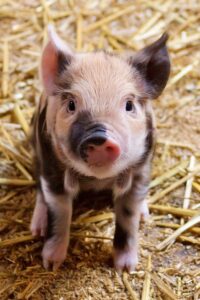
Pigs also provide notable benefits, including meat and help with land clearing. However, they require appropriate feeding, ample shelter, and a reasonable amount of land for rooting and roaming.
Pigs are a valuable addition to a homestead as they effectively convert kitchen and garden waste into nutrient-rich manure ideal for organic farming. Their insatiable appetite for roots and grubs often leads them to turn over the ground, making them natural rototillers and land clearers. In terms of meat production, pigs provide a substantial amount of meat and a single pig can offer a variety of cuts such as bacon, ham, and pork chops.
On the downside, pigs require a significant amount of food and water, which can be costly. They’re also known for being escape artists, requiring sturdy fencing to keep them in check. Additionally, pigs can be quite destructive to the land, turning lush green pastures into muddy wallows if not properly managed. Their intelligence can also make them challenging to manage, especially if they aren’t given enough mental stimulation. Finally, pigs are susceptible to diseases such as swine flu and thus need regular health check-ups. Like any livestock, keeping pigs is a significant commitment and should be considered carefully.
Homestead Quails
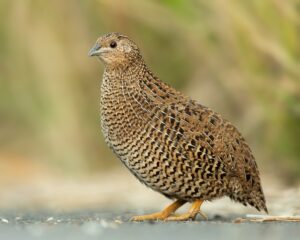
Quails are another excellent choice for the homestead, especially for those with limited space. These small birds, often raised for their eggs and meat, have a short life cycle—reaching maturity in just six weeks and beginning to lay eggs at eight weeks.
Quail eggs are considered a delicacy and can fetch a higher price in the market compared to chicken eggs. Additionally, their meat is a sought-after alternative to traditional poultry, offering a unique flavor.
In terms of care, quails need less space and food than chickens, making them more economical to raise. They’re also resilient birds, resistant to common poultry diseases. However, quails can be flighty and easily frightened, so a calm, secure environment is essential for their well-being.
On the downside, quails are more sensitive to cold than chickens, so adequate winter protection is necessary. And while their small size has benefits, it also means eggs and meat are produced in smaller quantities. As with any livestock choice, it’s crucial to weigh the pros and cons and consider how adding quails will fit into your overall homesteading plan.
Bee Keeping on the Homestead
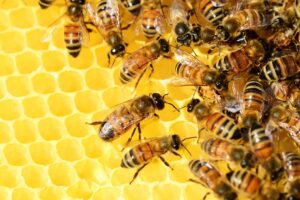
Bees are another viable addition to a homestead, adding biodiversity and offering unique benefits. On the pro side, bees are exceptional pollinators, which can enhance the productivity of your garden and local ecosystem. Keeping bees can also yield honey, a renewable resource with various culinary and medicinal uses. The beeswax harvested from beekeeping can be utilized for making homemade candles, cosmetics, or other products.
However, there are also some challenges to consider when keeping bees. One potential drawback is that some individuals may be allergic to bee stings, which could pose a significant health risk. Bee colonies also require careful management to prevent diseases and pests that can negatively impact the hive’s health. Moreover, beekeeping requires learning and adhering to local regulations as well as investing in the necessary equipment and hive maintenance. Lastly, bees can be affected by various environmental factors such as pesticides, lack of forage, and changing climate conditions, all of which can contribute to Colony Collapse Disorder and loss of the hive.
What is the Best Meat to Raise on a Homestead?
Raising meat on a homestead can be a rewarding experience, enabling you to enjoy fresh, organic, and ethically sourced products. When it comes to choosing the best type of livestock for your homestead, there are many factors to take into consideration such as space availability, feed sources, local regulations, and preferences. Popular choices include chickens, ducks, pigs, goats, and sheep.
Chickens are a great choice for home meat production as they require minimal space and can easily be integrated into an existing garden or backyard. Additionally, chickens are relatively low-maintenance animals, making them less labor-intensive than larger livestock such as cows or horses. They also provide eggs and compostable bedding.
My second choice would be rabbits for the same reasons, except no eggs! Another benefit is that rabbits make little if any noise. Also, they provide rabbit pelts you can sell or use in crafts.
More off the beaten path but the third on my list would be quail. They take up even less space than chickens, are less noisy and still produce eggs, albeit small ones.
What is the Most Self-Sufficient Farm Animal?
The most self-sufficient farm animals would be bees which I guess are not exactly an animal but they are included in the general list of homestead animals.
Bees need very little care from you to do what they do naturally. In particular, if you catch wild swarms adjusted to your area, which I would recommend. There is a learning curve and some upfront costs but after that bees are easy.
Next on my list would be rabbits. With a water bottle that won’t freeze and a self-feeder you could probably leave rabbits at home safely for a long weekend or perhaps as long as a week. It depends on your setup and the weather.
The same might be said for chickens and quail, however, goats and sheep need daily care so consider all that when deciding if you want to add them to your homestead. Who will care for them if you need to go out of town or become sick?
Conclusion:
In a nutshell, identifying the best homestead animals depends on your resources, needs, and interests. Chickens, rabbits, goats, pigs, bees, and more each come with unique advantages. You should weigh factors like availability of space, time, and dietary needs while settling on the most suitable animals for your homestead. Homesteading is a fulfilling journey, taking you back to basics and fostering self-sufficiency and a deep connection with nature. Make your choices wisely and relish the rewards of your hard work!
Explore the best homestead animals for your farm. From bees to rabbits, each animal comes with unique advantages. Start your fulfilling journey to self-sufficiency today!
For more on homesteading topics click here.
